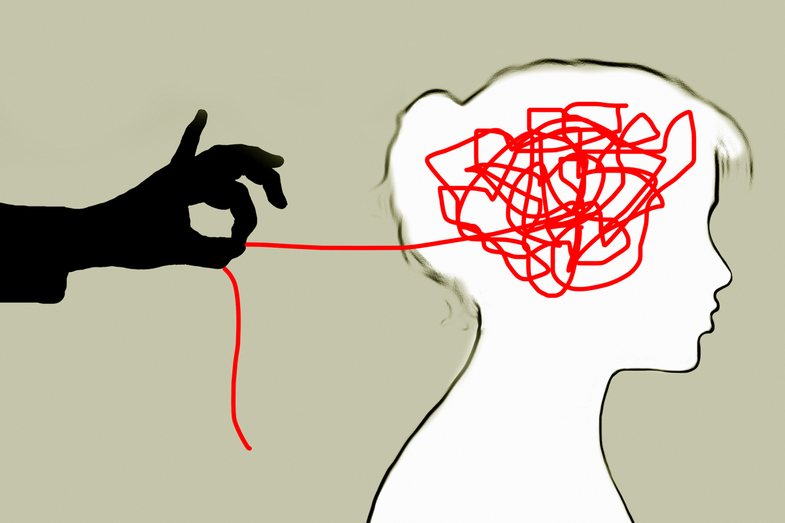
In small doses, stress can motivate you to complete a certain task or achieve a goal, but when stress becomes chronic, you can begin to experience all sorts of side effects and symptoms as a result. Stress can also cause physical changes in your brain.
# 1 - Stress can affect your memory
Studies have shown that "people with higher cortisol levels * have poorer memory than people of the same age with less cortisol," psychotherapist Ann Russo told Bustle.
Studies have also shown that how you view and treat stress can change the impact it has on your brain. It is important to try to see and re-evaluate the situation in a more positive light. Try to redirect your thoughts, work on some ways to relieve stress, do exercises, meditate or even follow a therapist to learn more positive problem coping skills.
# 2 - Stress can increase the size of your amygdala
The amygdala is the part of the brain that plays a key role in processing emotions. If you are under large amounts of stress regularly, this can eventually change the size of your brain amygdala and this can affect the way you feel.
"Chronic stress can increase the size of the amygdala, which can make the brain more receptive to stress, creating a brain that becomes predisposed to a constant state of 'fighting or fleeing. You are prepared to look for threats.' "so you see threats wherever you go, which reinforces your brain 's belief that it is constantly under attack," says Maenpaa.
# 3 - You may experience "Allostatic overload"
"When boredom, stress and anxiety are chronic and extreme, people get tired and tend to give up," says Dr. Paul Napper, "and that can lead to a burning sensation."
Neurobiologists use the term "allostatic overload" to describe this condition. When you are under pressure all the time, your body can not make adjustments to help you, as it usually would.
#4 – Mund të ndiheni të dëshpëruar dhe në ankth
Niveli i lartë i kortizolit në gjak për një kohë të gjatë, mund të dëmtojë trurin dhe pjesë të tjera të trupit, duke ju bërë më të prekshëm nga sëmundjet e tjera.
Shkencëtarët ende po mësojnë për stresin kronik dhe të gjitha mënyrat se si mund të ndikojë në shëndet, por deri tani dihet që ai mund të rrisë rrezikun e sëmundjeve kardiovaskulare, ankthi dhe depresionin.
#5 – Truri juaj mund të tkurret
"Nivele të larta të kortizolit që mund të grumbullohen me stresin kronik mund të dëmtojnë aftësinë e trurit për të funksionuar normalisht," thotë Diane Amstutz,PhD, psikologe.
Kjo mund ta ndryshojë trurin tuaj në një mënyrë tronditëse.
“Mund të vrasë qelizat e trurit dhe madje të zvogëlojë madhësinë e tij.”
Stresi kronik mund të zvogëlojë gjithashtu korteksin para-frontal, pjesën e trurit që lidhet me vetëkontrollin dhe rregullimin emocional.
#6 – Ju mund të ndiheni më pak social
Stresi mund të ndikojë në trurin tuaj në një mënyrë që ju bën të ndiheni më pak social.
Përsëri, e gjitha është për shkak të kortizolit të tepërt.
Dr. Michael Genovese, një psikiatër klinik, thotë për Bustle:
“Mund të prishë funksionin e një sinapsi (vendi ku qelizat e trurit komunikojnë me njëra-tjetrën).
Një studim i vitit 2014 i botuar në Nature Communications zbuloi se stresi kronik mund të “shkëpusë” sinapset në tru, gjë që ndikon për të na bërë më pak social dhe më të izoluar. Nëse kohët e fundit po ndiheni më introvert se zakonisht, shkaku mund të jetë stresi.
#7 – Stresi mund të zvogëlojë neuronet tuaja
"Stresi, veçanërisht stresi kronik ditor siç është një punë stresuese ose një sëmundje kronike, mund të çojë në ndryshime strukturore në tru që lejojnë mbijetesën dhe mbrojtjen e tij”, shprehet Dr. Margherita Mascolo.
Studiuesit e kanë parë këtë në modelet e kafshëve, të cilat kanë treguar se stresi "shkakton një zvogëlim të neuroneve. Neuronet janë qelizat nervore që transmetojnë informacionin.
Ndryshime të tilla mund të çojnë në një ulje të aftësisë suaj për të marrë vendime, për të risjellë ndër mend kujtime ose për të rregulluar emocionet tuaja.
Small daily stressors are not to worry about, as they are a typical part of life that can not be avoided, but watch out for signs of chronic stress, such as anxiety, forgetfulness or isolation, as they can all have a huge impact. in your brain as well as in your overall well-being.
Some of the scientific articles on which the article is based can be found here , here , here and here .







